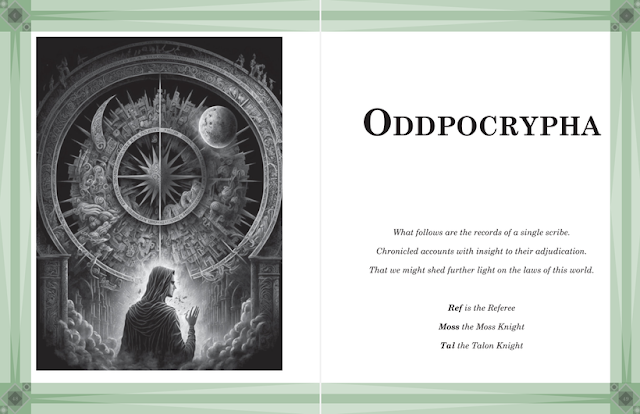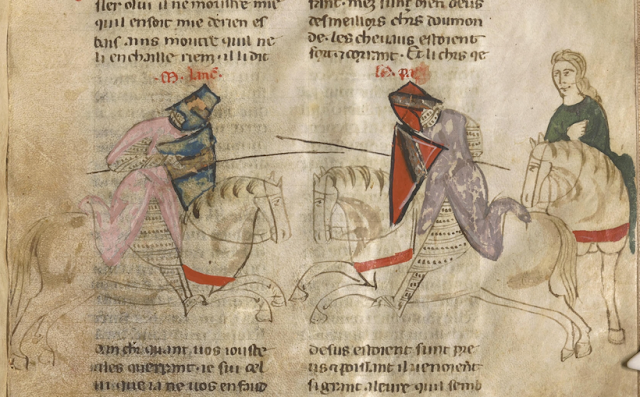Oof, was it really four months ago I last wrote about imperfect examples of play?
Well, I'm finally putting it into practice.
I've got this thing about making my games a self-contained
book that doesn't need any additional support. Of course, with RPGs it's
common practise to mine ideas from dozens of books and blend them together, but
I like the idea that somebody could pick up one of my games and feel like they
have everything they need in a single volume.
Rules are the easy part, but I also want to make sure that
players have good guidance on how to actually run things, and enough adventure
content to get things started.
With Into the Odd there's a few pages of guidance for
running the game, a short example of play, and an adventure module with a
dungeon, wilderness, and small town. The Oddpendium is just a heap of
random tables to gesture broadly at the rest of the world. I wanted this to
feel a bit like those box sets where you get your rules and adventure all ready
to go. Something you can buy one day and feel like you can sit down and run it
that evening.
Electric Bastionland takes a different approach. Here
I wanted guidance and procedures over providing specific library content. Sure
there are all the failed careers, but I wanted this book to focus on getting
people making their own adventures, their own version of Bastionland. It's all
about procedures and principles for the conductor to internalise so that the
world will eventually start to just flow out of them. The Oddendum is
where I can luxuriate in mini-essays talking about the word, the game, and how
to run it, in many ways a greatest-hits of my relevant blogposts over the
years. It's not as easy to pick-up-and-go as Into the Odd, but my hope was that
once it all clicked people would find it easier an more fun to run.
In approaching Mythic Bastionland I knew I wanted to do
something different. Of course the flavour is different, the focus lies in a
different style of play, and the rules have been warped, but I also wanted a
new approach to how I'd advise the person running the game. Finally, I'm
feeling good about the direction of the game now that I've started to work on
the Oddpocrypha section, putting the focus on a large bank of examples
of play, each accompanied by notes breaking down what happened, why, and how
things could have been done differently.
There are a few in the playtest doc right now, but I'm aiming to have this be a
significant chunk of the book.
Here's how one of them might look, followed by the text
itself.
CHARACTER CREATION
PLAY
Ref: So in this game you’re both Knights, but you’ll have
different strengths and weaknesses. Start by rolling your Ability Scores.
They’re Vigour, Finesse, and Charm. For each you’ll roll a d12 and a d6 and add
them together. High is better, 10 is average.
Hands a character sheet to each player. They start
rolling their ability scores.
Tal: Okay, so I got Vigour 11, Finesse 14, Charm 7.
Moss: I got Vigour 6! Urgh. At least my Finesse and Charm
are higher, 10 and 12.
Ref: Yeah that’s pretty bad! Don’t worry though, just means
you’ll need to be crafty and not rely on brute force. The scores might get
better later too as your character ages. There’s this rule where… Actually,
scrap that for now. You need to roll d6 for your Guard. This is how good
you are at avoiding getting hit or taking lasting damage.
Tal: Okay, 3, I guess that’s okay.
Moss: I got 6! Guess I’m crafty like you said.
Ref: Okay now you each get to be one of these Knights.
Ref fans through the book, showing some of the entries
for Knights.
Ref: The book says you can choose from here or roll. What do
you think?
Moss: Obviously we should roll.
Tal: Oh I dunno, I don’t want to be stuck with a character I
don’t like.
Ref: Okay how about we roll, but if you hate what you get
then we’ll just choose instead.
Tal: Yeah, thanks.
They both roll Knights, getting the Moss and Talon
knights.
Tal: I get a bird? I’ll stick with this one!
Ref: Great, so this gives you some gear and a special thing
you can do. Let’s get it onto your character sheets and we can get
started.
THOUGHTS
When getting the players started with the game I like to get
them rolling their character as soon as possible, before I even start telling
them about the world. The things they discover in making their character will
get them immersed in the world right away.
It’s good that Ref gives a bit of context for Ability
Scores. If you’ve played a lot of RPGs it’s easy to assume that everybody will
work out the average of d6+d12, but just telling the players that 10 is average
gives them a point of reference for their character.
Getting bad rolls here can be disheartening, so it’s good to
see Ref reassuring Moss that their low Vigour score isn’t going to make their
character useless.
We can see that Ref almost goes into explaining the rules
for characters ageing, and how their Ability Scores can increase, but decides
not to overload the players right now. At this point it’s enough for the
players to know that their scores can change later, they don’t need to know the
details while they’re focused on their character in the here and now.
On our very first example, Ref is already breaking the
rules. The character creation process says nothing about letting the characters
roll a Knight and then decide whether to keep them or roll a different entry
instead, but Ref sees that Tal is feeling anxious about getting a character
they don’t like and decides to give the players the best of both worlds.
Ref could have stood firm, insisting that Tal either rolls a
character or chooses one, but instead Ref took the chance that Tal would
probably be happy with their character, but would appreciate the backup option
if they didn’t like the Knight they rolled.
This can go the other way, with some players finding it too
much choice to be handed a list of 72 Knights to choose from, so would rather
take the roll. A huge part of the Referee’s role is sensing the best option for
their group. If in doubt, just ask the players and trust them to be
reasonable.
TEACHING THE RULES
PLAY
Tal: Okay, now the rules?
Ref: So this is a bit more complex than Into the Odd, but
the core is the same. Wait, were you both here when we played that?
Tal: Yeah I think I remember all the rules.
Moss: Wait, no, I missed that week.
Ref: Okay I’ll start from scratch then. When you do
something risky I’ll ask you to roll a Save, so you’ll roll a d20 and try to
get equal or less than the Ability Score. So Moss if you made a Vigour Save
you’d need to roll 6 or less on a d20.
Moss: Got it.
Ref: Combat is… you know what we’ll deal with combat when it
happens. For now you just need to know that the die type next to your weapon is
the die you roll when you attack with it. So Moss your Cudgel does d6 damage.
Oh, and you have a Shield which gives you Armour 1, meaning you’ll take 1 less
damage from attacks against you.
Moss: Right. Does my bad Vigour score make my attacks weaker
too?
Ref: No actually. There are times in combat when it will
matter, but it won’t affect your attacks.
Moss: Oh right, that’s good then.
Ref scans over some of the other pages of rules and
prepared notes.
Ref: Yeah the rest we’ll just deal with as we get to it.
I’ll give you plenty of warning so I won’t just drop a horrible rule on you!
Tal: What are these things on my sheet? I’ve got Burdens and
Feats.
Ref: Right, right. Burdens are bad, you don’t want to have
them but sometimes you’ll get them! We’ll deal with them when they happen. Your
Feat is a special thing that only you can do. There are some other ones linked
to combat but… you know what let’s just get started and we’ll do a little
combat brief when it happens.
Moss: Sounds good, let’s go.
THOUGHTS
Here I’ll show my bias toward getting the game started as
soon as you can, backloading as much of the rules explanation as possible.
The game is designed in such a way that players don’t need
to know all of the rules to begin with, but there are some important
considerations with this approach.
Players may be relieved that they don’t need to learn rules
immediately, but some may worry that they’re going to make a critical mistake
without knowing all of the details of how the game works.
Here Ref starts with the bare minimum, explaining how Saves
work. This is a nice rule to start with as it’s very simple and gives further
context for the information on the players’ character sheets. They get a little
bogged down talking about weapons and armour, and frankly I think Ref could
have skipped this whole section, sticking to the line that combat will be
explained when it happens.
It’s natural for players to ask about other parts of their
character sheet that they don’t yet understand, here the Burdens and Feats. Ref
could have just said “we’ll deal with that later” but here I like that they at
least gave the context for those things, if not the actual rules in detail. Now
Tal understands what those things are, but hasn’t needed to learn exactly how
they work in game terms.
Something that Ref missed here is explaining the objective
of the characters. In this game the Oath gives Knights a very clear purpose, so
I would encourage Ref to at least explain the Oath and warn the players that
they’ll be judging themselves on their adherence to it at the end of the
session.
The conversational style of writing is a tricky one, and the
potential for cringe is high, but I'm hopeful that I can make this into
something useful for potential referees.
This post was originally sent as a reward to all Patreon supporters, and is released freely on this site the week after its original publication.
If you want to support my blog, podcasts, and video content then head over to my Patreon.




